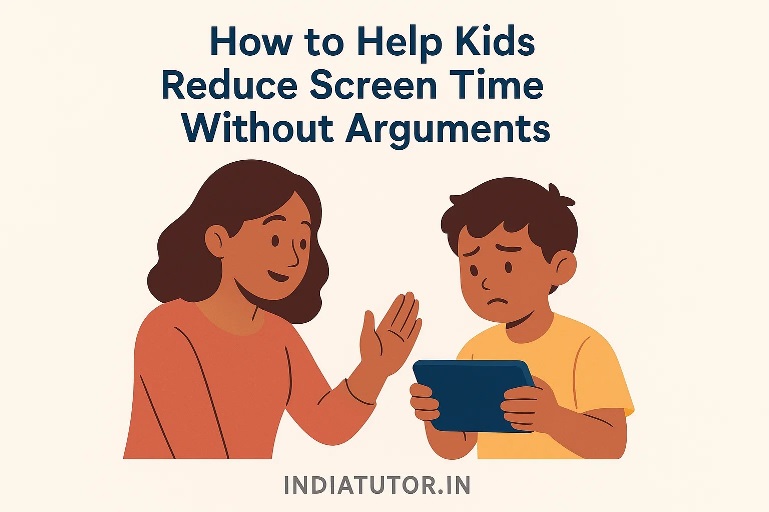In today’s world, screens are everywhere—phones, tablets, TVs, laptops—and children are growing up surrounded by them. While technology can be a powerful learning tool, too much screen time can lead to poor attention span, less physical activity, eye strain, and even sleep problems. Many parents know this but struggle to reduce their child’s screen time without it turning into daily battles. The good news is that there are ways to guide children towards healthier habits while keeping peace at home.
Understand the root cause
Before setting rules, it helps to understand why your child is spending so much time on screens. Is it boredom? Are they avoiding homework? Or do they simply enjoy the instant entertainment? When you know the reason, you can address it more effectively. For example, a child who plays games out of boredom may respond well to engaging offline activities, while a teenager binge-watching shows might need better sleep routines.
Set clear and realistic limits
Research shows that consistency is key when it comes to behaviour change. The American Academy of Pediatrics recommends no more than 1–2 hours of recreational screen time per day for children over 6 years old. Instead of announcing strict bans overnight, start with small, realistic limits. For example, agree on “no screens during meals” or “no gaming after 8 PM” and gradually build from there.
Involve your child in the process
Children are more likely to follow rules they help create. Have an open conversation about why you want to reduce screen time and ask for their input. You might be surprised—many kids admit they also feel tired or distracted after long hours on a screen. Work together to set daily limits, choose alternative activities, and decide what happens if the limits are crossed.
Offer attractive alternatives
If screens are the only fun option, kids will naturally resist giving them up. Encourage activities that spark their interest—cycling, drawing, board games, puzzles, or even cooking together. For younger children, setting up a creative corner with craft materials can be exciting. For older children, introducing a hobby like photography, music, or sports can be a great substitute.
Be a role model
Children often mirror the behaviour of their parents. If they see you scrolling endlessly on your phone, they will believe it’s normal. Try following the same rules you set for them. For instance, put your phone away during family time or read a book in the evening instead of watching TV. This shows them that balance is possible.
Create tech-free zones and times
Having specific places and times where screens are off-limits helps children form habits naturally. Common examples include no screens in the bedroom, no phones at the dining table, and a tech-free hour before bedtime. Studies show that children who avoid screens before sleeping fall asleep faster and get better rest.
Use technology to control technology
Ironically, technology can help you reduce screen time. Many devices have built-in parental controls that allow you to set daily usage limits or block certain apps after a set time. This shifts the responsibility away from you as a “strict parent” and makes the rules feel like part of the system.
Be patient and consistent
Reducing screen time is a process, not a one-time change. There may be complaints or slip-ups at first, but consistency will make a big difference. Praise your child when they stick to the limits, and focus on the positive results—more time for family, better focus, improved sleep, and new skills.
Helping children manage their screen time is not about taking away something they love—it’s about teaching them to use it wisely. By setting clear limits, offering engaging alternatives, and leading by example, parents can encourage healthier habits without constant arguments. Over time, your child will learn to balance their digital and real-world experiences, which is a skill that will benefit them for life.
By Nidhi Mehta – Founder – IndiaTutor.in
🔥 Post Engagement
👁️ 14 Total Views
🔥 1 Views Today
📈 14 Views Last 7 Days
Share:
WhatsApp | Facebook | Twitter | LinkedIn
To share your Feedback or Review – Contact Us
Are you a Tutor? Register your Tutor profile on India Tutor to connect with Students in India and Abroad.
Are you a Parent or Student? – Submit Tutor Wanted Form to reach relevant tutors registered on IndiaTutor.in.
Do you own a Tuition Center? Want to connect with students in your local area? List your center with us.
Free Online Self Evaluation Tests for Tutors and Students
Read our Reviews Have Questions? Read FAQs

